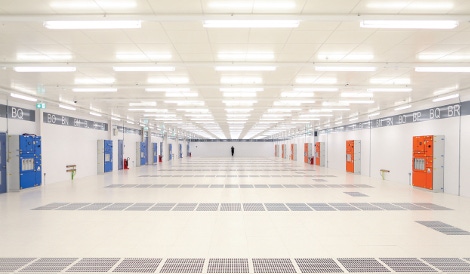After Telx Deal, Digital Realty Has Delicate Balance to MaintainAfter Telx Deal, Digital Realty Has Delicate Balance to Maintain
Doubling down on retail colo means competing more directly with Equinix, one of Digital’s biggest customers

Its acquisition of Telx has put Digital Realty in a rather precarious position of competing more directly with one of its biggest customers: Equinix.
More than anything, San Francisco-based Digital is a provider of wholesale data center space, and retail colocation companies like Eqiunix and Telx lease space from companies like Digital as part of their real estate strategy. Digital has had a retal-colo play of its own for some time now, but the $1.9 billion Telx deal takes that play to a whole new level. Telx is one of the biggest colo companies in the US, managing more than 1.3 million square feet of data center space across 20 facilities, 11 of them within Digital’s buildings.
Both Equinix, based in Redwood City, California, and Telx have pursued a strategy of stimulating growth of ecosystems within their data centers, where customers and service providers interconnect their networks. The bigger the ecosystem, the more attractive the facility is for others, who can interconnect with a multitude of customers, network providers, or partners in a single building.
A major part of this ecosystem play is connecting enterprises to cloud service providers, including the biggest cloud companies, such as Amazon, Microsoft, Google, and IBM SoftLayer. Equinix executives have said repeatedly that connecting customers directly to these service providers was the fastest-growing service in its portfolio.
These services allow enterprises to take advantage of public cloud while bypassing the public internet. The main advantages are in performance and security. While Equinix is far ahead of Telx in building out this cloud-on-ramp business, Telx has pursued it quite aggressively as well.
Scott Peterson, chief investment officer at Digital who architected the acquisition, said that while there will be some overlap between Digital’s newly expanded colo business and Equinix, there are plenty of customers Equinix is not really after that Digital can target.
“They’re still a very important customer, and obviously colocation companies [in general] are very important customers of ours,” Peterson said. “They have their IBX, and we’re not going to try to create something that’s going to be a head-to-head competitor with the IBX.”
IBX stands for International Business Exchange, which is what Equinix calls its data centers that act as interconnection hubs. “They established that and got ahead of everybody,” Peterson said.
“We’ve renewed all of our leases with Equinix last year on 15-year terms with multiple five-year renewal options,” John Stewart, senior VP of investor relations at Digital, said.
Equinix, Peterson said, has emphasized fostering an ecosystem of interconnection between content providers and companies that deliver content to consumers. “If you want to connect to those ecosystems, you need to be in an Equinix facility.”
However, there are many companies outside of that content-provider-eyeball-network world that rely on cross-connect services in highly connected buildings, and those are the customer Peterson sees as an opportunity to expand the Telx-charged colo part of Digital’s business that will not infringe too much on the Equinix territory.
Connectivity to cloud providers is a different matter. “Digital has had a big emphasis on that – and Telx has as well – and this is going to get us further down the road in terms of being a comprehensive provider,” Peterson said. “We’re all going to compete for that. Nobody’s going to get the franchise on it, if you will.”
Digital reported $420 million in revenue for the second quarter Thursday, up 5 percent year over year. Its net income for the quarter was $138 million.
Equinix also reported its second-quarter results this week, saying it made about $666 million in revenue, up 3 percent year over year, and about $60 million in net income.
Read more about:
EquinixAbout the Author
You May Also Like







